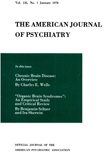A Theory of Addiction as an Artificially Induced Drive
Abstract
The author advances the hypothesis that while drug abuse may be a symptom of psychological or social disturbances, when addiction supervenes it is no longer a symptom but a morbid condition of its own; its development will not be affected by removal of the initiating factors. Addiction has the strength and character of a natural drive: it may be considered as an artificially induced drive developed through chemical stimulation of the pleasure center. The author observes that addiction occurs spontaneously among insects and can easily be induced in other animals.
Access content
To read the fulltext, please use one of the options below to sign in or purchase access.- Personal login
- Institutional Login
- Sign in via OpenAthens
- Register for access
-
Please login/register if you wish to pair your device and check access availability.
Not a subscriber?
PsychiatryOnline subscription options offer access to the DSM-5 library, books, journals, CME, and patient resources. This all-in-one virtual library provides psychiatrists and mental health professionals with key resources for diagnosis, treatment, research, and professional development.
Need more help? PsychiatryOnline Customer Service may be reached by emailing [email protected] or by calling 800-368-5777 (in the U.S.) or 703-907-7322 (outside the U.S.).



